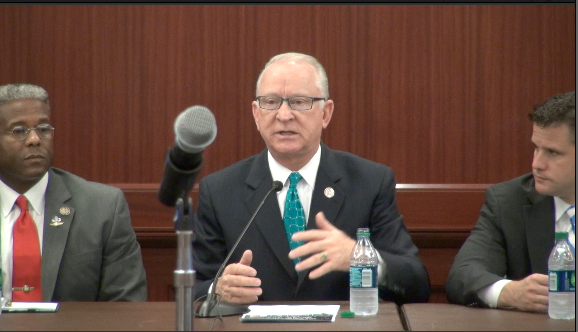WASHINGTON – With across-the-board budget cuts in defense spending slated to begin next year, House Republicans are pushing the administration to prevent “devastating” effects for U.S. security.
The chairman of the House Armed Services Committee, Rep. Buck McKeon, R-Calif., on Thursday warned that the $1.2-trillion in reductions – known as sequestration – would come at the expense of the nation’s military. McKeon made his remarks at the
conservative Heritage Foundation think tank in Washington, part of a GOP push before Congress’ August recess.
As part of last year’s Budget Control Act, more than $500 billion, or 43 percent of the total cuts will come from the Pentagon if Congress does not act before the lame duck session. Other government programs such as Medicare, Medicaid and Social Security would also see reductions.
“This is very crippling going into the future,” said McKeon, “It’s hard to convince people there is danger out there.”
McKeon said even though the U.S. is winding down its military engagement in the Middle East, the cost to maintain its defense readiness is still high, thus the cuts will harm the nation both inside and out. He said while the U.S. troops could be less capable in protecting its people and allies overseas, sequestration will also take a heavy toll on the domestic defense industrial base and workforce.
“We are still in a very fragile economy,” said McKeon, “the defense contractors are sending out layoff notices since there are so many uncertainties.”
McKeon said the largest defense contractors such as Lockheed Martin have seen fewer job applications.
Two other Republicans at the discussion, Rep. Adam Kinzinger of Illinois and Rep. Allen West of Florida, said by creating the smallest Army since World War II, the smallest Navy since 1950 and the smallest Air Force ever, sequestration puts the U.S. military at an unusually high risk.
“If we are not careful, in the next eight to 10 years, the world’s largest navy will be flying Chinese flags,” warned West, a 22-year Army veteran.
Kinzinger, a former Air Force lieutenant, added that once the U.S. military had to reduce its operational duties due to cost concerns, the rest of the world would be affected.
“Either nobody will stand up for their freedom anymore, or countries like China and Russia will take the role,” he said, “If we pull back, they will be more aggressive. That’s human nature.”
Both the Senate and House have passed the Sequestration Transparency Act of 2012, which aims to require President Barack Obama to detail how the administration will implement the across-the-board cuts – and how those cuts will affect individual agencies. The legislation is waiting for the president’s signature.

